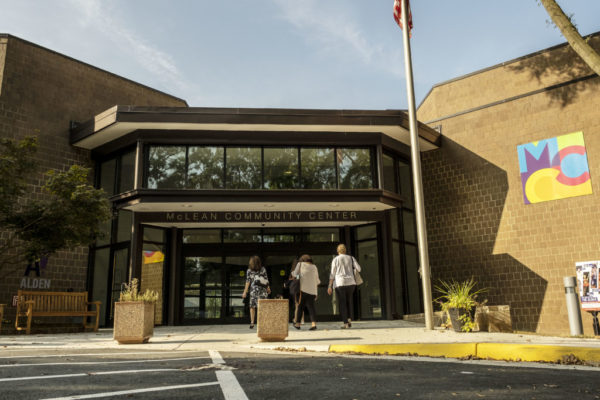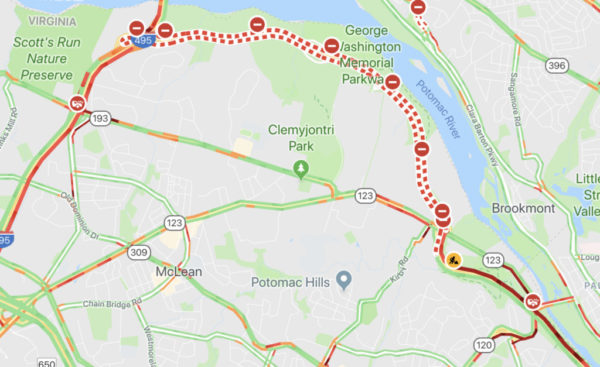Construction crews are working to fix the cause of a sizable sinkhole that opened up on the GW Parkway back in March — inconveniencing those who regularly travel on the road.
The sinkhole was caused by a failed drainage structure, Aaron LaRocca, a spokesperson of the National Park Service, which maintains the GW Parkway, said.
The structure was made of brick and was originally built more than 60 years ago, he added.
In an attempt to fix the issue, LaRocca said NPS removed the old system which required them to dig 50-feet underground and crews are now in the process of installing a new drainage pipe.
“We know this construction is inconvenient, and we’re working hard to reopen the lane to traffic as soon as it’s safe,” LaRocca said. “We’re looking forward to sharing an update when the work is complete.”
NPS expects to reopen both lanes of traffic by mid-October, LaRocca said, but restoration for the area is expected to last longer.
National Park Service tells @ABC7News both northbound lanes of the GW Parkway near 495 should finally be open by the end of October.
Only one lane has been open since a sinkhole opened up back in March.
It’s causing bad traffic throughout the day. pic.twitter.com/FnoXOqJYYX— Tom Roussey (@tomrousseyABC7) September 26, 2019
Map via Google Maps
As conditions worsen on GW Parkway, some McLean residents question when they will see repairs.
Charles Cuvelier, the new GW Parkway superintendent, told attendees at the McLean Citizens Association (MCA) meeting on Tuesday (Sept. 10) that the parkway will need work to maintain structural integrity.
“After 60 years, the brick and mortar has become porous,” he said.
A community member at the meeting said that she finds the road frightening to drive on. In terms of repairs to potentially dangerous areas, the superintendent said that data about traffic and other roadway incidents are used to identify which areas of the roadway need immediate attention.
He noted that one of the worst areas in terms of damage is Route 123 near Chain Bridge.
In March, a giant sinkhole opened in the region, causing havoc and closures for those who frequent the roadway. To repair much of the road, crews will need to solidify the ground up to 50 feet under, Cuvelier said.
The next steps are unclear since community leaders rely on grants from the federal government for repairs, Cuvelier said. They will submit the next round of grants in 2020, and if approved, construction will likely begin in 2022 to be completed in 2023, he added.
Until now, the National Park Service and Virginia Department of Transportation have been relying on grants of $30 million or less for small maintenance projects, Cuvelier said. He referred to the funding allowance between federal and state funds as a “regional formula.”
Cuvelier said the National Park Service is working with VDOT and the Federal Highway Administration to find solutions for repairs. When a community member asked if they could see the correspondence, he replied that they have nothing to hide and community members are free to file a Freedom of Information Act request.
Louise Epstein sits on the MCA board as the chair for the budget and taxation committee. She is also the president of her neighborhood homeowners association, which backs up to GW Parkway.
“The problem is that we are relying, unfortunately, on hope. I’m sort of a cynic and I don’t like to rely on hope,” Epstein said, “Things are falling apart, and we need to figure out what’s going on.”
She added that she doesn’t think federal grant money will be enough to fix the problem, saying that the community needs to begin brainstorming new ways to come up with funding to fix the highway.
“We have to look for other ways to get that money sooner,” Epstein said.
Update on 3/24/19 — The sinkhole has been filled and all lanes of the Parkway have reopened, according to the National Park Service.
Sinkhole filled! Road repaved. And the George Washington Memorial Parkway will reopen in all directions about 2 pm. Huge thanks to @USDOTFHWA @VaDOT and @VSPPIO for all the help! https://t.co/CNjDfOEKCc pic.twitter.com/uVpWOAV65X
— Jenny A-S NPS (@NPSJennyAS) March 23, 2019
Earlier: The northbound lanes of the GW Parkway are closed due to a large sinkhole that was discovered overnight.
Heavy rain Thursday may have contributed to the sinkhole’s formation.
It’s reportedly located near the Dead Run Trail, closer to the Parkway’s junction with the Beltway. The road was completely closed between Route 123 and the Beltway for much of the morning. The southbound lanes were reopened Friday afternoon.
Northbound traffic is being diverted onto Route 123, which in turn had morning rush hour traffic backed up at least a mile and a half past Chain Bridge.
No word yet on when the sinkhole might be repaired, though the northbound lanes are expected to remain closed through the weekend. Crews are currently evaluating the extent of the damage, said to be caused by a broken storm water pipe.
More from a National Park Service press release:
Northbound George Washington Memorial Parkway will remain closed through the weekend as road crews and engineers work to fully assess the extent of the sinkhole and repair the road.
Throughout the day, crews have been working to excavate around a damaged stormwater drainage pipe to determine the best way to safely and effectively fill the void and quickly reopen the road.
Preliminary findings indicate that the sinkhole is about 10 feet deep, 12 feet wide and 30 feet long. Once crews complete the extensive excavation work needed to fully access the damaged area, experts will better be able to determine how long it will take to fully repair the pipe and rebuild this section of road before reopening the northbound Parkway to travel.
As a critical link in the region’s transportation network, closing the George Washington Memorial Park is never a decision that is made lightly. The National Park Service is cautiously hopeful that some travel may be permitted by Monday, but drivers should follow local news or visit www.nps.gov/GWMP for the latest information.
Just before 6 a.m. Friday, March 22 a car traveling northbound in the right lane hit the sinkhole adjacent to the road. The driver lost control of their vehicle hitting a stone wall before coming to rest just off the side of the Parkway. When first responders arrived on scene they determined there was an active sinkhole under the road and initiated a closure of the northbound Parkway.
The driver was evaluated by paramedics on scene but declined any further care.
An initial assessment of the road found a large sinkhole deep under the surface of the roadway that extended for an unknown distance. Out of an abundance of caution, National Park Service maintenance crews in consultation with public safety personnel and experts from the Federal Highway Administration, made the hard decision to also close the southbound lanes.
Further assessment revealed damage to a large concrete stormwater drainage pipe that runs deep below the Parkway. Experts from the Federal Highway Administration worked quickly to better assess the potential risk to the southbound lanes, and ultimately determined is did not post an immediate threat. At approximately 11 a.m. the NPS reopened the southbound lanes for travel.
Sinkholes are common occurrences in the Greater Washington area, and are often preceded by high volumes of rain like the region saw on March 21.
More information will be released when it is available.
More via social media:
Our road crew is on scene with @ffxfirerescue and we are calling additional experts to evaluate extent of damage. Extended closure likely. #VaTraffic https://t.co/0uGomupBbQ
— Jenny A-S NPS (@NPSJennyAS) March 22, 2019
Sinkhole below GW Parkway appears to be caused by a broken storm water pipe deep below ground. This is unrelated to the road surface or condition of the GW Parkway. Once we know how long the void is & associated risk we’ll determine extent of continued road closure. #VATraffic pic.twitter.com/mvwQhHsfh8
— Jenny A-S NPS (@NPSJennyAS) March 22, 2019
#BreakingNews GW Parkway south of 495 in #vatraffic is now completely CLOSED, video from #Chopper4 shows workers measuring a sinkhole appearing to be about 6-8 feet deep and three feet wide, possibly running under roadway #dctraffic @nbcwashington @wtop pic.twitter.com/uwdYQYoqvW
— Brad Freitas (@Chopper4Brad) March 22, 2019
MAJOR TRAFFIC ALERT: Thursday's deluge likely contributed to a large sinkhole along the George Washington Memorial Parkway in Fairfax County that has caused major traffic issues Friday morning. https://t.co/EEXmymJ2Ti @caitlinrothfox5 #fox5traffic pic.twitter.com/WqYJoLcdQj
— FOX 5 DC (@fox5dc) March 22, 2019
Both lanes of the GW Parkway are still shut down, as they were when there was a traffic nightmare during the morning rush hour.
This is the scene of a sinkhole in-between the Beltway & 123 that caused all this. pic.twitter.com/FdlIm3C0OP— Tom Roussey (@tomrousseyABC7) March 22, 2019
Getting up close look at the damage on the GW parkway now – half the road is completely gone @nbcwashington pic.twitter.com/sTUZZjTlsz
— Adam Tuss (@AdamTuss) March 22, 2019
Map via Google Maps




